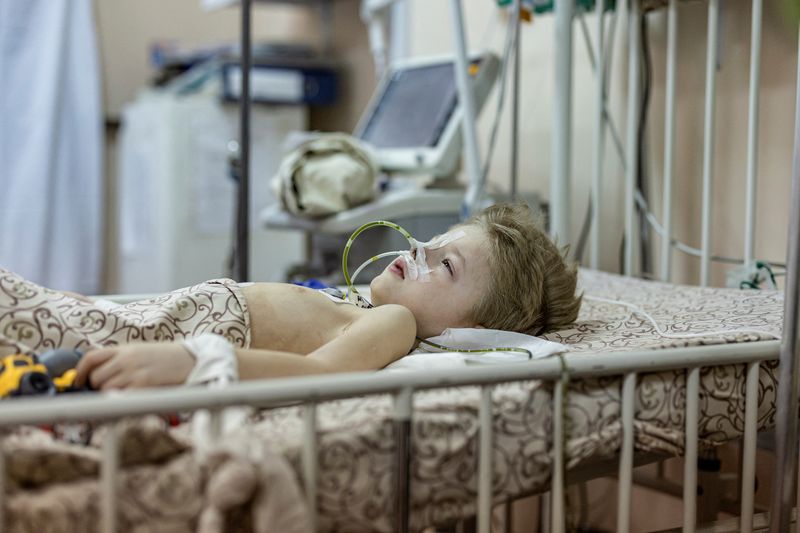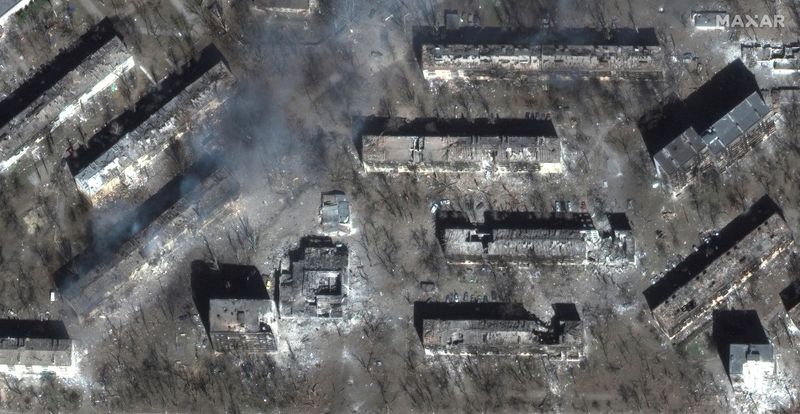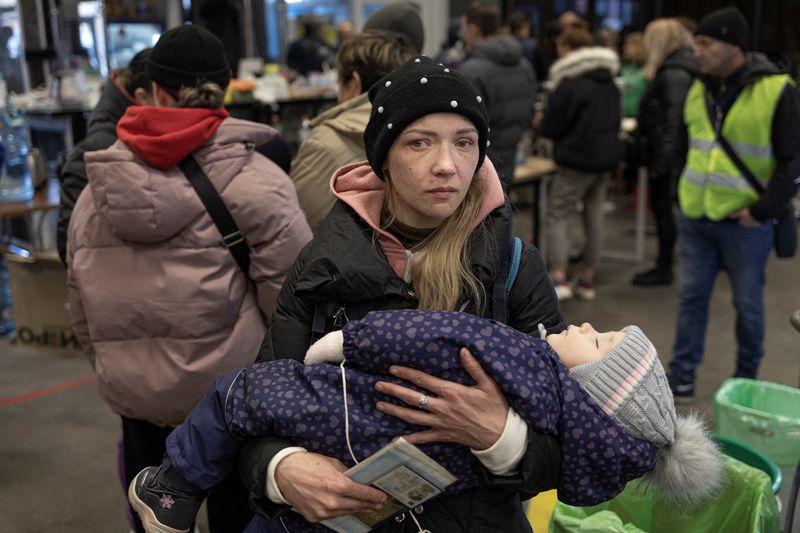By Vitalii Hnidyi and Sergiy Karazy
MALA ROHAN/NEAR IRPIN, Ukraine (Reuters) – Russian forces bombarded the outskirts of Kyiv and a besieged city in northern Ukraine on Wednesday after promising to reduce attacks there in what the West dismissed as a ploy by Moscow to stem its heavy losses and regroup for other offensives.
Nearly five weeks into an invasion in which Russia has failed to capture any major city, the top U.N. human rights official said Moscow had bombed 50 hospitals as well as homes and schools across Ukraine in what may amount to war crimes.
Ukrainian officials called Russia out for having said on Tuesday it would curtail operations near the capital Kyiv and the northern city of Chernihiv “to increase mutual trust” for peace talks.
“It’s not true,” Kyiv mayor Vitali Klitschko said in a video address to European Union regional officials. “The whole night we listened to sirens, to rocket attacks and we listened to huge explosions east of Kyiv and north of Kyiv. There are immense battles there, people died, still die.”
Intensified bombardment could be heard in Kyiv on Wednesday morning from suburbs where Ukrainian forces have regained territory in recent days. Windows rattled from the relentless artillery on its outskirts.
Southeast of Irpin, a Kyiv suburb which has seen intense fighting for weeks, frequent shelling and ordnance exploding on the ground and in the air could be heard. Ukrainians evacuating spoke of heavy shelling north of Irpin and shells landing in Irpin itself.
Ukraine and Western leaders had cautioned that Moscow’s apparent peace gesture at Tuesday’s talks in Istanbul was a cover for reorganizing forces that had failed to take Kyiv.
Russia said on Wednesday its forces had achieved their objectives near Kyiv and Chernihiv and were regrouping to focus on the “liberation” of the breakaway eastern Donbas region.
The Pentagon said that Russia had started to reposition under a fifth of its forces arrayed around Kyiv, but warned Moscow was expected to refit and resupply them for redeployment.
OIL AND GAS SUPPLY DOUBTS
Western sanctions imposed on Russia as punishment for its invasion have largely isolated its economy from world trade but Moscow is still the biggest supplier of oil and gas to Europe. Russia’s new demand for payment in roubles, rejected by the West, has raised fears of energy shortages and heightened recessionary risks in Europe.
Germany, Russia’s biggest gas customer, declared an “early warning” on Wednesday of a possible emergency if Russia were to cut off supplies. Economy Minister Robert Habeck urged people to reduce consumption, saying “every kilowatt-hour counts”.
Russian sources told Reuters it might keep the energy contract currency as is, with final payment in roubles.
Floating a potential compromise, Russian President Vladimir Putin told German Chancellor Olaf Scholz that payments could be made in euros and sent to Gazprombank, which would convert the money to roubles, a German government spokesperson said.
Gazprombank is one of the main channels for payments for Russian oil and gas.
“Scholz did not agree to this procedure in the conversation, but asked for written information to better understand the procedure,” the spokesperson said.
TRAPPED
In northern Ukraine, Chernihiv’s Mayor Vladyslav Astroshenko said Russian bombardment of his city had intensified over the past 24 hours, with more than 100,000 people trapped inside with just enough food and medical supplies to last about another week.
“This is yet another confirmation that Russia always lies,” he told CNN. He said 25 civilians had been injured in a mortar attack in the city centre.
Reuters could not verify the situation in Chernihiv. Russia’s defence ministry did not reply to a request for comment.
Reuters journalists who entered the Kyiv suburb of Irpin, recaptured by Ukrainian forces this week, on Tuesday saw Ukrainian troops patrolling an abandoned ghost town of ruined buildings, with the body of an old man and a woman lying on the streets.
Around a quarter of Ukrainians have been driven from their homes and the United Nations said on Wednesday that the number who have fled the country had risen above 4 million. More than half of those refugees are children and the rest mostly women.
Over the past week, Ukrainian forces have recaptured towns and villages on the outskirts of Kyiv, broken the siege of the eastern city of Sumy and pushed back Russian forces in the southwest.
In the village of Mala Rohan in the eastern Kharkiv region, two burned-out tanks with their turrets ripped off stood near damaged houses. Maksym, a Ukrainian soldier, said the Russians were being pushed back “slowly but steadily”.
“Most of them already understood that they made a huge mistake when they came here. Therefore, I think they have no chance here, we will win.”
Russia’s defence ministry said the humanitarian situation in Kharkiv was getting worse and accused Ukrainian forces there of shooting at civilians, Russian news agencies reported, without presenting evidence.
Russia says it is carrying out a “special operation” to disarm and “denazify” its neighbour. Western countries say Moscow’s invasion was entirely unprovoked.
The Donbas region, where Russia says it will now focus its efforts, includes the port of Mariupol, where heavy fighting was again reported on Wednesday.
Mariupol, which had a pre-war population of more than 400,000 people, has been laid waste in a month. The United Nations says thousands of people may have died there.
Russian forces were shelling nearly all cities along the region’s frontline on Wednesday, said the governor of Donetsk, which is part of the Donbas.
(Additional reporting by Natalia Zinets, Pavel Polityuk, Gleb Garanich and Reuters bureaux; Writing by Peter Graff, Philippa Fletcher and Rami Ayyub; Editing by Frank Jack Daniel, Gareth Jones and Grant McCool)






